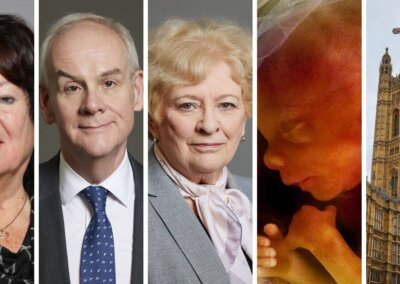More than 700 abortions have been carried out in Northern Ireland since the UK imposed an extreme abortion regime on the province, new figures have revealed.
In response to a written question, submitted by Traditional Unionist Voice MLA Jim Allister, Health Minister Robin Swann disclosed 719 terminations took place between 31 March and 14 October.
The tragic figure shows an additional 55 lives have been lost to abortion since the Belfast Telegraph reported on 2 October that 664 terminations had taken place.
‘Every death a tragic loss’
Commenting on the figures, Mr Allister said there is a “shameful” lack of attention being given to the 719 lives lost to abortion compared to the 563 lives lost to COVID-19 during the same time period.
The pro-life MLA told News Letter: “We’re all rightly concerned about the suffering and death caused by the pandemic in NI and across our nation, with every death a tragic loss for families.
“There is, however, another deadly threat to the lives of the youngest, most innocent and venerable which shamefully is not receiving anything like the same attention.”
These 719 abortions represent “lives snuffed out deliberately” he said, adding: “What a contrast – medical professionals strive desperately to save lives, while others abort lives!”
The News Letter noted that Mr Allister lamented the fact he had submitted a range of other questions about abortion, which remain unanswered weeks after they were meant to be.
Abortions appear to be on the increase
The 719 abortions over a period of six-and-a-half months appear to show that the extreme abortion legislation imposed on Northern Ireland is likely resulting in more terminations.
For example, figures from the UK Department of Health and Social Care show that 1,014 NI women travelled to England or Wales for abortions during the whole of 2019.
In that same year, less than 10 women travelled from Northern Ireland to Scotland for a termination according to Scotland’s Information Services division.
In addition, the figures only highlight abortion notifications submitted to the Northern Ireland Department of Health and don’t include terminations resulting from BPAS’ illegal ‘DIY’ home abortion ‘service’.
Extreme abortion regime
Last year, in the absence of a functioning Northern Ireland Assembly, politicians in Westminster’s House of Commons and House of Lords voted to force radical abortion legislation on the province.
The new regime allows abortion up to the point of birth for all disabilities, including cleft lip, club foot and Down’s syndrome.
Abortion is available de-facto on demand through to 24-weeks and available on-demand, without conditionality up to 12 weeks of pregnancy, for the first time in the UK, allowing for sex-selective abortion to be available on-demand.
Push for ‘DIY’ home abortions
Abortion activists are hoping to push the already extreme legislation further and want ‘DIY’ home abortions to be commissioned across the province, despite serious safety concerns across Great Britain following the potential murder of a baby unexpectedly born alive and other extreme issues with safety.
Turning a blind eye to the serious safety concerns, Belfast Alliance for Choice co-convenor Emma Campbell said that travelling to a hospital or healthcare centre was “unnecessary” and complained that Northern Ireland is the only place in the UK and Ireland not to have officially commissioned ‘DIY’ home abortion services.
Despite assurances there would be “no change” to abortion regulations and that in-person consultations remain “an essential safeguard” for women, the UK Government announced on 30 March it would temporarily allow ‘DIY’ home abortions in England, for the next two years or until the COVID-19 pandemic is over.
Just one day later, the devolved Governments in Holyrood and the Welsh Assembly introduced ‘telemedicine’ abortions in Scotland and Wales.
All three Governments made the very substantial change without any public consultation, parliamentary scrutiny or debate.
The Northern Ireland Assembly, which had reconvened by this point, did not commission ‘DIY’ home abortions, despite pressure from abortion providers BPAS and Marie Stopes International.
Public consultation
A spokesman for the Northern Ireland Health Minister, Robin Swann, has previously told Irish News they have “publicly stated” that its legal advice says while the department is “not required to commission the relevant services”, the law now allows registered medical professionals to carry out abortions.
“The regulations require such terminations to be carried out on Health and Social Care premises. This advice was communicated to Trusts in April,” he added.
“Decisions remain to be taken on the commissioning of abortion services in NI’s health service. Commissioning is a significant process that will require a public consultation. It will clearly be [a] matter for the Executive and Assembly as well as the Department.”
Unwanted
A spokesperson for Right To Life UK, Catherine Robinson said: “Tragically, the extreme abortion regime being forced upon the people of Northern Ireland has already resulted in the abortion of at least 719 unborn babies.
“Every one of these abortions represents a failure to protect the lives of babies in the womb and a failure to offer full support to women with unplanned pregnancies.
“Northern Ireland is a country where 100,000 people are alive today because they chose protecting unborn babies over accepting the same abortion law that was introduced into Britain in 1967.
“The people of Northern Ireland did not want these extreme abortion regulations imposed on them and still do not want them.
“Northern Ireland politicians must urgently repeal this extreme abortion legislation imposed upon them and begin conversations on how they can better support women and unborn babies.”












